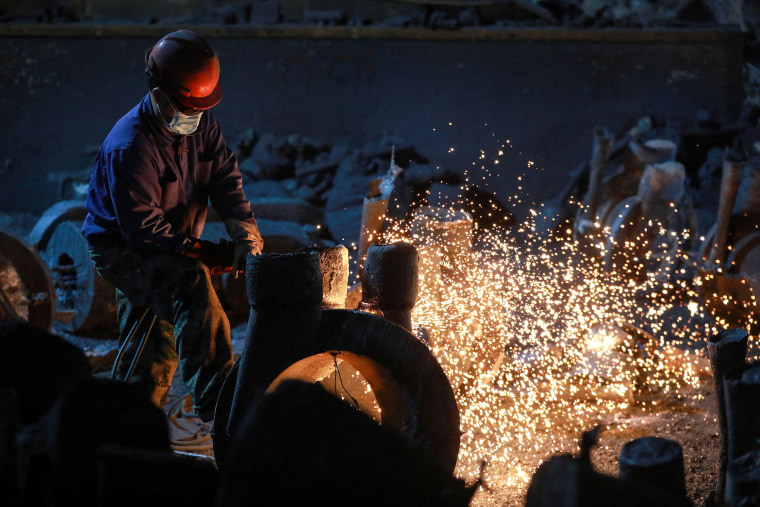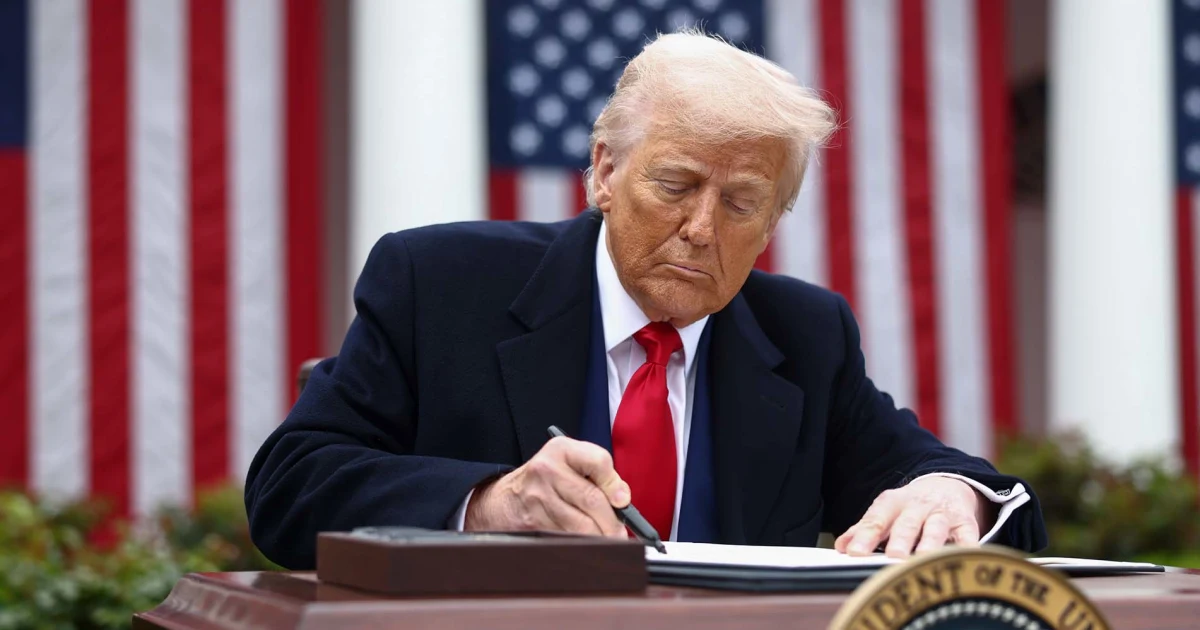Calling the U.S. tariffs “extremely regrettable,” Japan said it will examine the impact on domestic industries and will take “all necessary measures,” including providing support for cash flow.
“We will promptly establish a special consultation service and provide support for cash management and fund procurement,” chief cabinet secretary Yoshimasa Hayashi told reporters in a regular news briefing.
Hayashi said he would not disclose the “specifics of what is being considered” when asked if Japan was considering arbitration by the World Trade Organization or reciprocal tariffs.
Japan’s Nikkei index closed 2.8% lower Thursday.
French officials slammed President Trump’s 20% tariff measures on all goods imported from the European Union, saying that the bloc could be expected to retaliate in mid-April, and then again in late April.
The first of the two responses by the EU will tackle Trump’s attacks on aluminum and steel, followed by the broader range of products and services, French government spokesperson Sophie Primas told local broadcaster RTL radio Thursday.
“We are also going to attack services,” she said, including online services from Google, Apple, Facebook, Amazon and Microsoft. She added that the EU would also review access of U.S. companies to procurement contracts in Europe.
France is “ready in this trade war,” Primas said, after accusing Trump of behaving like he’s “master of the world” and of having an “imperialist posture.”
Markets across Asia slid after some of the highest Trump tariffs targeted countries in the region.
In Vietnam, which was slapped with some of the Trump administration’s highest tariffs of 46%, the mains stock index dropped nearly 7% amid fears the levy could impact its manufacturing industry, which is closely tied to American brands like Nike, American Eagle and Wayfair.
Hong Kong’s Hang Seng Index stood 1.5% lower this afternoon (local time), and Shanghai’s SSE Composite Index was down 0.3%. Japan, where officials urged U.S. to reconsider the 24% levy, the Nikkei 225 index fell by 2.7%.
European markets have opened with heavy losses as traders on the continent react to the Trump administration’s global 10% base level tariffs and 20% levies on the European Union.
The STOXX Europe 600 Index — a basket of Europe’s largest companies — was down around 1.8% shortly after the open, with Germany’s DAX index the worst hit among the bourses of Europe’s major economies. That’s no surprise given that Germany is the continent’s industrial powerhouse.
The European companies whose share prices have been worst hit by the fresh taxes are retailers popular in the U.S. such as jewelry manufacturer Pandora and sportswear brands Adidas and Puma — stocks in all three companies had dropped 10% shortly after markets opened.
But it’s perhaps in heavy industry where European business will feel the worst of the pain. Engineering firm Siemens was down 4% and steel-maker Thyssen Krupp fell 3.4%. German carmakers — after President Trump imposed huge new tariffs on foreign car imports — suffered losses, with Volkswagen, Mercedes-Benz, BMW and Stellantis all down 2% or more.
The U.K.’s major index, the FTSE 100, suffered comparatively small losses of 1.3%. With Trump imposing just the 10% base tariff rate on the British economy, U.K. Prime Minister Keir Starmer told journalists that “nobody wins in a trade war, that is not in our national interest. We have a fair and balanced trade relationship with the US.”
Starmer added that the U.K. would only make a trade deal with Trump “if it is in our national interest and if it is the right thing to do for the security of working people, protects the pound in their pocket that they have worked hard to earn”.
President Donald Trump has favored tariffs for years. His expanding trade war is sure to ripple through the global economy for a long while, too.
That’s because ramping up tariffs on foreign governments frequently draws retaliation — a likelihood that even industries Trump aims to support are already bracing for. While he has been rolling out an ever-shifting series of import taxes for months, the sweeping “reciprocal” tariffs he announced yesterday are opening salvos in what could become drawn-out tit-for-tats with potentially dozens of governments.

Steel production in Hangzhou, eastern China.AFP – Getty Images
Unlike the narrower, targeted tariffs Trump imposed on certain countries and products in his first term, his latest duties are set to rewrite the rules of global trade on a far broader level — and in an environment in which inflation is running hotter.
“This is a game changer, not only for the U.S. economy but for the global economy,” Olu Sonola, head of U.S. economic research at Fitch Ratings, said in a note Wednesday evening.
“Many countries will likely end up in a recession. You can throw most forecasts out the door, if this tariff rate stays on for an extended period of time,” she said, adding that the levels Trump is introducing haven’t been seen since 1910.
The European Union is preparing further countermeasures against U.S. tariffs if negotiations fail, according to European Commission President Ursula von der Leyen.
President Donald Trump had imposed 20% tariffs on the bloc on Wednesday.
Speaking on a livestreamed broadcast, von der Leyen said that Trump’s move was a “major blow” to the world economy.
“There seems to be no order in the disorder, no clear path to the complexity and chaos that is being created as all U.S. trading partners are hit,” she said.
Shortly after Trump’s announcement, the British government said the United States remains the U.K.’s “closest ally.”
Business Secretary Jonathan Reynolds said the U.K. hoped to strike a trade deal to “mitigate the impact” of the 10% tariffs on British goods announced by Trump.
“Nobody wants a trade war and our intention remains to secure a deal,” said Reynolds. “But nothing is off the table and the government will do everything necessary to defend the U.K.’s national interest.”
China urged the Trump administration to cancel the new U.S. tariffs and said it would “resolutely take countermeasures” to protect its rights and interests.
The latest round of tariffs leaves China, one of the largest U.S. trading partners, facing the highest U.S. tariff rate with a combined total of at least 54%.
“The so-called ‘reciprocal tariffs,’ based on the U.S.’s own subjective and unilateral assessments, violate international trade rules, severely harm the legitimate rights and interests of other parties, and represent a typical act of unilateral bullying,” the Chinese Commerce Ministry said in a statement.
“Many trading partners have already voiced strong dissatisfaction and clear opposition,” it said, adding that the U.S. should “resolve differences with its trading partners through equal-footed dialogue.”
Apple slid more than 6% in late trading on Wednesday and led a broader decline in tech stocks after President Donald Trump announced new tariffs of between 10% and 49% on imported goods.
The majority of Apple’s revenue comes from devices manufactured primarily in China and a handful of other Asian countries. Nvidia, which manufactures new chips in Taiwan and assembles its artificial intelligence systems in Mexico and elsewhere, fell about 4%, while electric vehicle company Tesla dropped 4.5%.
Across the rest of the megacap universe, Alphabet, Amazon and Meta all dropped between 2.5% and 5%, and Microsoft was down by almost 2%.
If Apple’s postmarket loss is matched in regular trading on Thursday, it would be the steepest decline for the stock since September 2020.
The global financial services firm ING said a 20% reciprocal tariff from the United States on the European Union will hurt.
“It’s worsened the eurozone’s short-term outlook. Now, so much depends on European governments to push through with their planned fiscal stimulus and reforms to strengthen domestic economies,” it said.
“Wednesday’s tariff announcements by Donald Trump should be the final reminder for Europe that the Transatlantic relationship has changed for good. And this doesn’t only apply to security and defense policies.”
Ireland Prime Minister Micheál Martin slammed the 20% tariff on imports from across the European Union, calling it “deeply regrettable.”
“I strongly believe that tariffs benefit no one. My priority, and that of the government, is to protect Irish jobs and the Irish economy,” he said.
Manfred Weber, the president of the EPP, the European Parliament’s largest party, said Wednesday: “To our American friends, today isn’t liberation day — it’s resentment day. Donald Trump’s tariffs don’t defend fair trade; they attack it out of fear and hurt both sides of the Atlantic. Europe stands united, ready to defend its interests, and open to fair, firm talks.”
